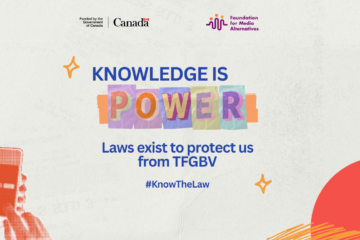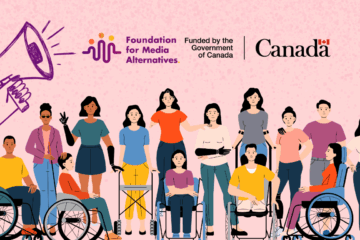How mobile phones are empowering Filipino women and girls
In this post, Lisa Garcia, Programme Coordinator Gender & ICT, and Christina Lopez, Programme Assistant, at the Foundation for Media Alternatives, share focus group insights on how mobile phones are changing the way Filipino women communicate.
The Philippines is the 12th largest country in the world, with a population of over 100 million. And its global footprint is large, with over 10 million Filipinos living and working around the world, making mobile and Internet communication vital.
How Filipinos communicate has changed rapidly, but only 43% of Filipinos have Internet access. Mobile phones are helping to change this. The number of Filipino women who now have access to mobile phones and benefit from their use is on the rise, and for many it is their first Web-enabled device.
Because of the importance in mobile phones in increasing Internet access, we wanted to find out more about how women are using them. As part of the Women’s Rights Online project, we conducted a series of focus group discussions to find out more from young women, students, housewives and working women in about the perceived benefits of their mobile phones. We focussed on this group because of the 43% of the Filipino population that has Internet access, the majority are located in urban areas.
The discussions showed that the mobile phone is the first choice of digital device among many Filipino women. In fact, it has taken the place of many other devices: alarm clock, camera, music player, phonebook. We drilled deeper to find out why the mobile is such a popular choice, and how women are using it.
The discussions produced three main findings:
1. Both homemakers and working women use mobile phones for economic benefits
Mobile phones helps women save time and money by avoiding unnecessary trips and errands. Working women can receive and send emails, browse websites, book flights, and transfer money to banks and navigate directions using their mobile phones. Many focus group participants cited portability as a key benefit, allowing them to run their small businesses from anywhere.
For housewives who have home-based livelihood activities, mobile phones improve their means of income. For example, one participant said she uses a mobile phone to take customers’ orders and look for possible traders. Another said she is able to post products on social networking sites and find prospective customers online. However, many Filipino women still do not use of ICTs to augment their incomes, so this area has plenty of space to be developed.
2. Staying in touch with family and friends is a key reason for buying a mobile phone
Many of the group’s participants cited keeping in touch with friends and family as a top reason for getting a Web-enabled mobile phone. For mothers and housewives, mobile phones play a vital role in nurturing their family relationships. The women also said they feel more secure when their children and spouses have mobile phones because they can reach them wherever they are and at any time.
As around one tenth of the Filipino population lives overseas, the Internet plays a key role in keeping families connected with relatives working abroad. They use the Internet to share news and to transfer money.
Female students also use mobiles to keep in touch with friends and classmates, and use Web-enabled mobile phones for research purposes and engaging with classmates on social networking sites.
3. Online gender based violence is a problem, but most Filipino women do not know how to report or stop it
Cyberbullying, cyberstalking, sexual harassment, misogynistic speech and invasion of privacy are still common challenges faced by Filipino women when using Web-enabled devices. Our focus group discussions revealed that most of the time, women ignore such threats and violations of their rights online because they are not familiar with their rights or they do not know what to do to stop the online violence, what charges they can file or where they can get help.
Laws and policies exist but so far have been insufficiently implemented. Our discussions revealed that offline gender based violence and bullying often relocates to the digital space, particularly social networking sites. The existing and upcoming laws and policies should be reviewed to ensure the safety and welfare of women online, as well as ensure equal rights and opportunities to both men and women.
The Foundation for Media Alternatives is in the process of making a Philippine Declaration on Internet Rights and Principles that would ensure the Internet is a transformative space to promote gender equality, diversity and social justice for everyone. We have a lot of work to do to get the remaining part of the Filipino population, particularly rural residents, online, but we are hopeful that the Declaration can set the tone for a safe and free space when they arrive.
We will use the input from our focus group discussions to inform our campaigns, and work for an Internet where women can enjoy freedom of expression and privacy of communication and learn about their rights online. Hopefully, 5 to 10 years from now, at least double the number women will have access to the Internet and enjoy the many benefits and opportunities of the Web.



0 Comments